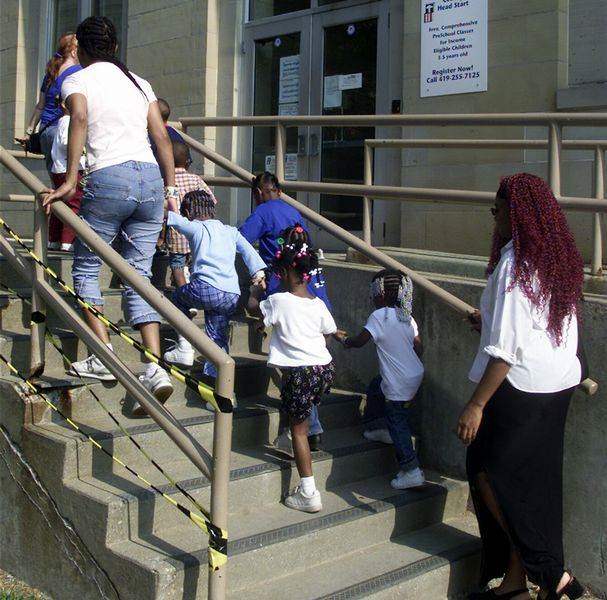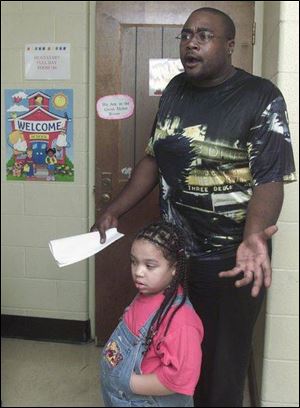
Head Start study bars some pupils
10/3/2002
Head Start students and their teachers enter a center in downtown Toledo.
More than 2,000 eligible children nationwide - including 20 from the Toledo area - are being denied access to the federally funded Head Start program because a consultant studying the program's effectiveness wants to see how they fare.
Head Start provides educational, health, and social services to low-income children and families. To be eligible, families must receive public assistance or live below the federal poverty level, defined as an income of $18,100 or less for a family of four.
For the next four years, The Blade has learned, a $20 million study will follow two groups of children selected at random nationwide. One group will attend Head Start. Children selected for the other group, called the control group, may stay home or attend another child-care program, but may not receive any Head Start services.
“It's heart-rending for us to have to deny services to anybody,” Dr. Sylvia Huntley, director of the Toledo-Lucas County Head Start, said.
Several parents whose children attend Toledo-Lucas County Head Start said they were upset to learn that the study prevents some eligible children from enrolling. Those children, they said, will be deprived of an educational foundation that could someday lead to a successful career.
“They could've stopped a lawyer. They could've stopped a nurse,” said Christopher Love, whose 4-year-old daughter attends a Head Start center in downtown Toledo. “They've muffled those kids' learning process.”

Christopher Love, with his daughter, Khari, 4, criticizes the study for the negative effects it could have on a child.
Since it began in 1965, Head Start has served more than 15 million children at a cost of more than $40 billion. The program, which is managed by the federal Department of Health and Human Services, received $6.5 billion in fiscal year 2002.
Congress ordered a study of the Head Start program in 1998 to determine its effectiveness. Westat, Inc., a Maryland-based research service, was hired to conduct the study, which is beginning this fall.
The study will follow between 5,000 and 6,000 U.S. children. Study coordinators already have selected more than two-thirds of the participants. About 40 percent will be in the control group, said Michael Lopez, federal project officer with the Department of Health and Human Services.
Several experts and legislators interviewed by The Blade agreed the study is needed to prove that Head Start deserves more tax dollars.
“There is the great ethical dilemma of having an expensive program for millions of children that doesn't work well,” said Dr. Thomas Cook, a professor of sociology, psychology, education, and social policy at Northwestern University who served on the committee that oversaw the study's design.
Some Head Start officials say they are concerned, however, about denying services for the sake of the study.
“When we know that there are children who need services and the study puts us in a position where we can't offer them, that raises a major concern,” said Barbara Haxton, executive director of the Ohio Head Start Association.
Children in the study were selected from Head Start programs overseen by about 82 local agencies around the nation, Mr. Lopez said. Study coordinators only chose local programs that had full enrollment and waiting lists in 2000.
Full programs would exclude some registered children regardless of the study, he noted.
“Ethically, we only could go into centers where the number of eligible children is more than the number that could be served,” Mr. Lopez said.
But The Blade found some Head Start centers in the study still have vacancies.
The two Ohio programs in the study are the Toledo-Lucas County Head Start, managed by the Economic Opportunity Planning Association of Greater Toledo, and a Head Start program 30 miles north of Dayton in Piqua, managed by the Council on Rural Services.
The Toledo program is still trying to fill more than 200 of its 3,057 available slots. The Piqua centers, which can serve 1,507 children, are 96 percent full.
“It's been difficult to know that we can't enroll a certain number of children,” said Dayvenia Chesney, manager of operations for early child-care programs at Piqua's Council on Rural Services. “Our staff has worked pretty hard to get [the local control group] children in other programs, but not everyone can afford them.”
In Michigan, 175 children - 104 in the Head Start group and 71 in the control group - have been selected so far for the study, Mr. Lopez said.
One selected program, administered by the Community Action Agency, serves 787 Head Start children in Hillsdale and Jackson counties. For the study, it has 42 children in the Head Start group and 20 in the control group.
Head Start programs in the study used normal recruiting procedures before study coordinators randomly selected children from those who registered.
In Toledo, the study will follow 30 children in Head Start and 20 in the control group. The Piqua program has 85 children in the Head Start group and 59 in the control group.
When parents signed up at selected Head Start programs, they got a notice explaining that their child might be chosen for the study and not allowed to enroll. Mr. Lopez contended that, by registering their child, parents gave “passive consent” for their child to be picked for the study.
Selection was not strictly random. Head Start programs were allowed to choose a few children that would not be placed in the control group. Programs gave exemptions to children with disabilities, severe family problems, or other troubles that made them “very high-risk.”
Toledo-Lucas County Head Start exempted two children, and the Piqua program exempted about a dozen.
The national study offers financial rewards for parents and caretakers who participate in interviews to evaluate their children's progress. Parents will receive $20 for each interview and an extra $25 for doing all the interviews.
The Blade was unable to interview parents of local children who were selected for the study because Head Start and Health and Human Services officials said federal privacy laws prohibited them from identifying individual students. Those officials also expressed concern that identifying participants might skew results.
Nitja Morrow, a West Toledo resident whose daughter attends Head Start, criticized the study's methods.
“I don't feel you should deprive any child of their education, and that's basically what they're doing,” she said. “If my child would've been picked [for the control group], I know I would've fought it.”
Yet many experts support this research design, noting that a comparison of children, attending Head Start and those not participating, is the best way to assess the program.
In theory, children who are registered for Head Start come from similar environments. So differences in achievement between those in the Head Start and control groups could be attributed to the program, rather than differences in family income, parental education, or other factors, experts indicated.
Only a small percentage of Head Start children nationwide were picked for the control group, experts pointed out, and these children may go to other child-care providers.
“I have no problem with randomization in this situation given that Head Start is not funded to serve all the eligible kids,” said Donna Bryant, research director of the Family and Child Care Research Program at University of North Carolina. “Head Start is always turning people away.”
But Dr. Bryant, who was on the committee that oversaw the study's design, said previous studies “have proven that early childhood intervention is effective.”
Two area members of Congress agreed that evidence shows early childhood programs work.
“Those who continue to question the effectiveness of early childhood education continually force us to prove what we already know,” U.S. Rep. Marcy Kaptur (D., Toledo) said.
Michael Hacker, aide to U.S. Rep. John Dingell (D., Dearborn), said Head Start's “value has been proven in community after community all over the country.”
Congressman Dingell, he said, “is confident another study would bear that out.”
But a 1997 report by the General Accounting Office concluded that existing research was insufficient to judge Head Start's impact. The report said the 22 good studies on Head Start were inadequate because they could not be applied to the nationwide Head Start population and did not use random assignment to a control group.
Opportunities for children in the study's control group will largely depend on their parents' ability to find and afford other child care services, officials said.
Becky Spencer, vice president of child care at the YMCA of Greater Toledo, said there are now other quality child-care programs in Toledo, although their services are not as comprehensive as Head Start's offerings. The outlook is worse for Michigan children placed in control groups.
“Many of the programs they could have as other options have all been cut,” said Mary Cunningham-Deluca, director of children's services for the Community Action Agency. “Many of the kids are going to go unserved, especially the three-year-olds.”